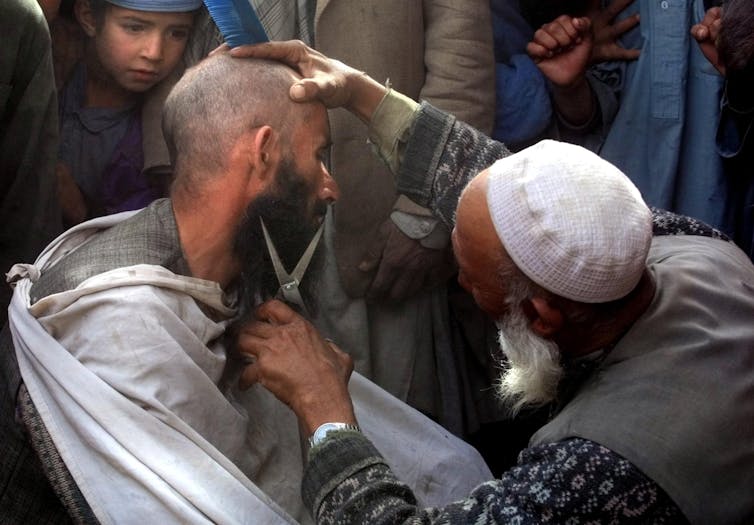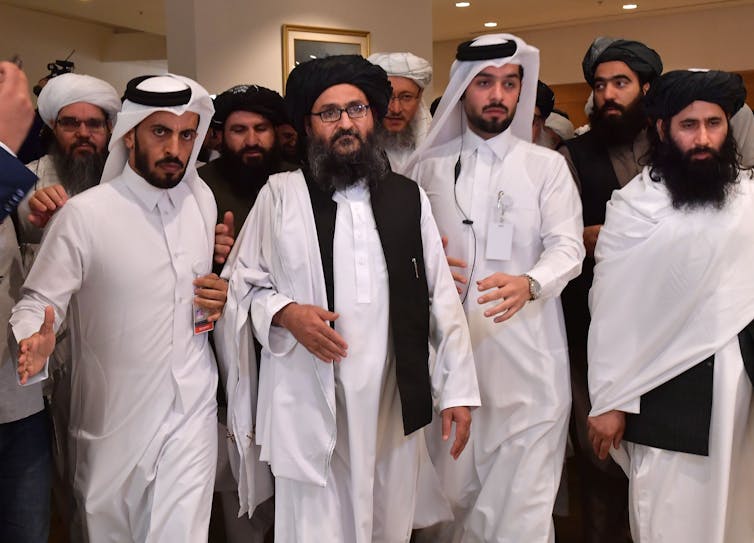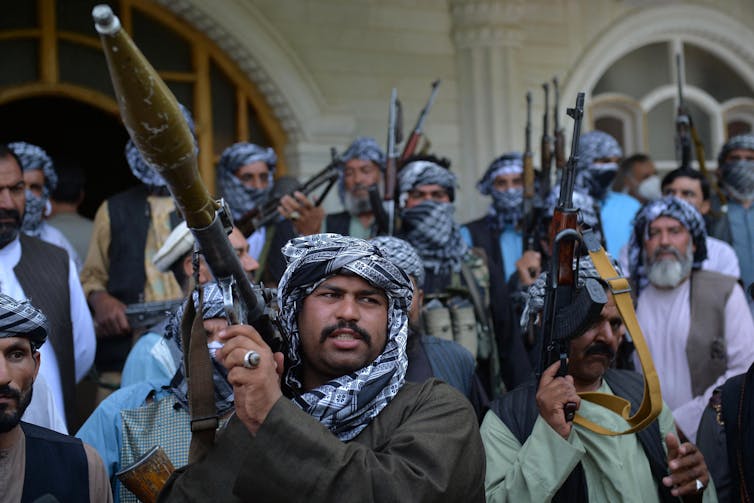The Taliban speak more moderately but their extremist rule hasn't evolved in 20 years
- Written by Sher Jan Ahmadzai, Director, Center for Afghanistan Studies, University of Nebraska Omaha
The Taliban are rapidly gaining territory in Afghanistan as the United States withdraws its forces from the war-torn country. The militant group now holds at least one-third of Afghanistan’s 364 districts[1].
For two decades the Afghan government has relied heavily on American military power to defend against the bloody insurgency of the Taliban, a radical Islamic organization that seized control of the country in 1996.
During the Taliban’s five-year rule – which was almost universally shunned by other governments but supported militarily and politically by Pakistan[2] – women were prohibited from working, attending school or leaving home without a male relative. Men were forced to grow beards and wear a cap or turban. Music and other entertainment was banned.
 Getting a trim in Kabul, November 2001.
Alexander Nemenov/AFP via Getty Images[3]
Getting a trim in Kabul, November 2001.
Alexander Nemenov/AFP via Getty Images[3]
Anyone not abiding by this code risked being publicly lashed, beaten or humiliated. Women who disobeyed these rules were sometimes killed[4].
Twenty years have passed since the 2001 United States invasion that quickly toppled the Taliban regime. Most Taliban fighters today are under 30. Some weren’t even born in 2001.
What does the group stand for today?
The Taliban then and now
The 2001 Taliban defeat was celebrated by Afghans inside and outside of Afghanistan.
Children started to fly kites and to play games – both previously banned. Couples played music at their weddings, and women left their homes for work without fear of being beaten by Taliban enforcers. Many men shaved their beards. Afghanistan opened to the world.
Kite-flying resurged in Afghanistan after the fall of the Taliban.Neither the Taliban nor violence disappeared as the climate of fear dispersed, but Afghans resumed some semblance of normal life.
Today, younger members of the Taliban, a group once known for eschewing technology, have adopted social media, TV and radios to promote their extremist version of Islamic law. The rhetoric of their older leaders has changed since 2001, too – at least on the international stage.
During peace negotiations and on visits abroad, the Taliban’s leadership has expressed both a belief that women have rights under Islamic laws[5] and a desire to reduce violence in Afghanistan. The group has also pledged to protect such public infrastructure as government buildings, roads and schools[6], which it has often attacked.
In very few areas of Afghanistan that the Taliban have controlled for many years, local members of the group have allowed girls to go to school after community leaders negotiated with local Taliban leaders[7].
A new emirate
But in newly captured areas their policies are more hard line.
According to various reports by the Afghan stations Radio Liberty and Radio Salam Watandar, Taliban rulers in Afghanistan’s North and Northeast have asked families to marry off one girl per family to their fighters[8]; said women should not leave home without a male relative[9]; and ordered men to pray in mosques and grow beards.
The Independent Administrative Reform and Civil Service Commission, an Afghan government agency, says public infrastructure has been destroyed[10] and social services halted in many Taliban-controlled areas, leaving 13 million people without public services.
All evidence suggests the Taliban still believe[11] in restoring their old system of emirate, in which an unelected religious leader, or emir, was the ultimate decision-maker. No one could challenge his verdicts because he was believed to have a divine authority from God.
“What has changed? Absolutely nothing,” Ahmad Rashid, a Pakistani journalist who has covered Afghanistan for 20 years[12], told Germany’s Deutsche Welle newspaper in July 2021. “The Taliban don’t believe in democracy. They just want the collapse of the government so they can reconquer Afghanistan and reimpose their system.”
 Taliban co-founder Abdul Ghani Baradar, center, after signing the Taliban’s accord with the U.S. in Qatar in February 2020.
Giuseppe Cacace/AFP via Getty Images[13]
Taliban co-founder Abdul Ghani Baradar, center, after signing the Taliban’s accord with the U.S. in Qatar in February 2020.
Giuseppe Cacace/AFP via Getty Images[13]
A dubious negotiating partner
The U.S. troop withdrawal follows a controversial February 2020 U.S.-Taliban accord initiated by former President Donald Trump.
In the deal, the U.S. agreed to withdraw from Afghanistan – fulfilling a long-standing Taliban goal – if the Taliban ceased violence against American forces, severed ties with al-Qaida and other terror groups and entered peace talks with the Afghan government[14].
U.S. President Joe Biden has defended his decision to leave Afghanistan[15], but there is good reason to doubt the Taliban’s commitment to peace.
According to a recent United Nations report[16], 5,459 Afghans have been killed since the 2020 U.S.-Taliban deal was signed, and the Taliban were responsible for 62% of those deaths.
In my decades of first working for the Afghan government and then studying Afghanistan as an academic[17], I have found no reliable historical evidence of the group’s abiding by any domestic agreement it signed with any party in Afghanistan.
It has killed opponents[18] at meetings allegedly called to discuss a truce and denied schooling to girls after committing to educate them.
The Taliban have so far kept their promise to the U.S. not to attack withdrawing American forces. But ongoing talks with the Afghan government have not resulted in a cease-fire or power-sharing agreement for Afghanistan.
“Why were the Taliban going to compromise once the [U.S. troop] exit date was given?” asked Pakistani Prime Minister Imran Khan at a July 2021 conference on security in Central and South Asia[19] I attended.
“Why would they listen to us when they are sensing victory?”
 Armed men gather in Herat to support Afghanistan security forces fighting the Taliban on July 9, 2021.
Hoshang Hashimi / AFP via Getty Images[20]
Armed men gather in Herat to support Afghanistan security forces fighting the Taliban on July 9, 2021.
Hoshang Hashimi / AFP via Getty Images[20]
Terror connections
Under Taliban rule, Afghanistan hosted many terrorists who perpetrated attacks on American interests worldwide.
The terrorists included al-Qaida leader Osama bin Laden, who planned the 1998 bombings of U.S. embassies in Kenya and Tanzania[21] and the Sept. 11, 2001, World Trade Center and Pentagon attacks. Bin Laden was killed by U.S. forces in his home in Pakistan in 2011[22], but al-Qaida cells continue to operate in Southwest Asia and beyond[23].
And the Taliban still associate with the group[24] – a violation of their 2020 accord with the U.S. According to a May 2021 U.S. government report, the Taliban “maintain close ties” with al-Qaida[25].
Recent reports from Indian security agencies[26] say Pakistan-based terrorist groups are partnering with the Taliban to fight Afghan forces inside Afghanistan, too.
Journalist Ahmad Rashid says with the U.S. gone, the Taliban won’t likely strike a deal as long as the Pakistani military continues to give their leaders and their families refuge in Pakistan[27]. The Taliban top brass is safe, while young Taliban fighters wage their insurgency in Afghanistan.
[Insight, in your inbox each day. You can get it with The Conversation’s email newsletter[28].]
References
- ^ holds at least one-third of Afghanistan’s 364 districts (www.longwarjournal.org)
- ^ militarily and politically by Pakistan (www.hrw.org)
- ^ Alexander Nemenov/AFP via Getty Images (www.gettyimages.com)
- ^ sometimes killed (rawa.org)
- ^ rights under Islamic laws (www.msn.com)
- ^ such public infrastructure as government buildings, roads and schools (news.yahoo.com)
- ^ go to school after community leaders negotiated with local Taliban leaders (www.msn.com)
- ^ marry off one girl per family to their fighters (swn.af)
- ^ leave home without a male relative (da.azadiradio.com)
- ^ public infrastructure has been destroyed (bakhtarnews.af)
- ^ Taliban still believe (ctc.usma.edu)
- ^ has covered Afghanistan for 20 years (www.dw.com)
- ^ Giuseppe Cacace/AFP via Getty Images (www.gettyimages.com)
- ^ peace talks with the Afghan government (theconversation.com)
- ^ defended his decision to leave Afghanistan (www.npr.org)
- ^ recent United Nations report (unama.unmissions.org)
- ^ studying Afghanistan as an academic (www.unomaha.edu)
- ^ killed opponents (www.hazara.net)
- ^ security in Central and South Asia (www.dawn.com)
- ^ Hoshang Hashimi / AFP via Getty Images (media.gettyimages.com)
- ^ the 1998 bombings of U.S. embassies in Kenya and Tanzania (cisac.fsi.stanford.edu)
- ^ in Pakistan in 2011 (www.npr.org)
- ^ continue to operate in Southwest Asia and beyond (theconversation.com)
- ^ still associate with the group (theprint.in)
- ^ “maintain close ties” with al-Qaida (media.defense.gov)
- ^ Indian security agencies (www.hindustantimes.com)
- ^ their leaders and their families refuge in Pakistan (www.dw.com)
- ^ You can get it with The Conversation’s email newsletter (theconversation.com)

















